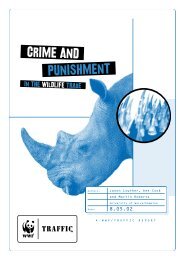Influencing Power - WWF UK
Influencing Power - WWF UK
Influencing Power - WWF UK
- No tags were found...
You also want an ePaper? Increase the reach of your titles
YUMPU automatically turns print PDFs into web optimized ePapers that Google loves.
22 <strong>Influencing</strong> <strong>Power</strong>Endnotes1Andrew Revkin, ‘Former Bush AideWho Edited Reports is Hired by Exxon’,New York Times, 15 June 2005.2Katherine Griffiths, ‘BP Shows Two Facesas it Fights US Bill to Cut CO 2 Emissions’,Independent, 12 June 2005.3Throughout this report we use corporateresponsibility or CR to refer to a businessapproach embodying open andtransparent business practices, ethicalbehaviour, respect for stakeholders and acommitment to add economic, social andenvironmental value. Other terms such ascorporate social responsibility orsustainability are used by others in thissense.4Reporting rates in small- and mediumsizedcompanies are typically much lowerthan in the largest multinationals.5See SustainAbility and UN GlobalCompact, Gearing Up: From CorporateResponsibility to Good Governance andScalable Solutions, 2004, for a morecomplete discussion of progress on CRand the gaps that need to be addressed ifthe world is to make significant progresson global challenges. The reporthighlights the need for business to helpevolve new policy frameworks — which inturn requires greater transparency andexternal engagement.6Corporate Leaders Group on ClimateChange, letter to <strong>UK</strong> Prime Minister TonyBlair, 27 May 2005.www3.cpi.cam.ac.uk/images/stories/downloads/clg%20letter.pdf7Seb Beloe (SustainAbility) and Jules Peck(now with <strong>WWF</strong> but in 2000 working forGPC), co-authors of this report, were alsoco-authors of Politics and Persuasion(SustainAbility and GPC, Politics andPersuasion: Corporate Influence onSustainable Development Policy, 2000).8The Center for Political Accountabilityhas produced a benchmark of corporateapproaches, but focused primarily onpolitical contributions: Center forPolitical Accountability, The GreenCanary: Alerting Shareholders andProtecting their Investments, 2005.9See, for example, Mark Goyder,‘Why the Business of Business is Morethan Business’, Ethical Corporation,21 June 2005.10Revkin (2005).11For example, ‘Edelman Fifth Annual TrustBarometer, Summary of Findings’,9 January 2004 and Globescan and WorldEconomic Forum, ‘Global Survey onTrust’, 2004.www.edelman.co.kr/people/ez2000/system/db/edeldata/upload/8/1074046712/edelman_2004_trust_barometer_findings.pdf12According to the Center for ResponsivePolitics, quoted in Bara Vaida, ‘SpillingCorporate Secrets’, Congress Daily, 27April 2005.13Amanda Griscom Little, ‘ForeignCorporations Spend Big to InfluenceUS Environmental Law’, Grist Magazine,3 June 2005.14Siim Kallas, ‘The Need for a EuropeanTransparency Initiative’, speech to theEuropean Foundation for Management,Nottingham Business School, 3 March2005.15www.corporateeurope.org16In addition to Greenpeace, this projectwas also supported by the BusinessCouncil for Sustainable Energy, Forum forthe Future, SustainAbility and <strong>WWF</strong>-<strong>UK</strong>.17Simon Caulkin and Joanna Collins with<strong>WWF</strong> et al., The Private Life of PublicAffairs, Green Alliance, 2003.18International Chemicals Secretariat for<strong>WWF</strong>, Cry Wolf: Predicted Costs byIndustry in the Face of New Regulations,April 2004.19Deborah Doane, From Red Tape toRoad Signs: Redefining Regulation and itsPurpose, CORE Coalition, 2004.20Roger Cowe and Jonathon Porritt,Government’s Business: EnablingCorporate Responsibility, Forum for theFuture, 2002.21www.jembendell.com/lw2002/autumn6.htmlwww.jembendell.com/lw2003/summer3.html22David Lascelles, The Ethics of Influence:Political Donations and Lobbying,Institute of Business Ethics, 2005.23Kallas (2005).24www.corporateeurope.org/alter-eu.html25Figures from the Center for PublicIntegrity, based on Senate Office ofPublic Records filings which includefigures dating back to 1998.www.publicintegrity.org/lobby/top.aspx?act=topcompanies andhttp://sopr.senate.gov/26To be eligible for inclusion on the S&PGlobal 100, a company must be amember of the S&P Global 1200, have aminimum float-adjusted market cap ofUS$5 billion and derive a substantialportion of its operating income, assetsand employees from multiple countries.www2.standardandpoors.com/servlet/Satellite?pagename=sp/Page/IndicesIndexPg&r=1&l=EN&b=4&s=6&ig=48&i=140&xcd=GBL10027As new CR reports are released regularly,it was necessary to set a cut-off date forreport collection. This was 1 May 2005.We are, however, aware that some CRreports which cover lobbying to somedegree have been released since thisdate, such as those from GE andVodafone.28This methodology has been developedover the course of a decade ofbenchmarking environmental and CRreports, and has been used most recentlyin the 2004 analysis of reporting,SustainAbility, UNEP and Standard &Poors, Risk & Opportunity: Best Practice inNon-Financial Reporting, 2004.www.sustainability.com/insight/research-article.asp?id=24729SustainAbility, UNEP and Standard &Poors (2004).30For example, these companies are allmembers of the Dow Jones SustainabilityWorld Index as of September 2004.31Lascelles (2005).32The sector groupings here are thoseused in the S&P Global 100.33Media is another sector with enormousindirect impacts. Of four mediacompanies in our benchmark, TimeWarner was the only one to have anyinformation on lobbying. See also point7 of the Media Manifesto inSustainAbility/<strong>WWF</strong>, Through The LookingGlass: Corporate Responsibility in theMedia and Entertainment Sector, 2004.www.wwf.org.uk/filelibrary/pdf/looking_glass_0105.pdf


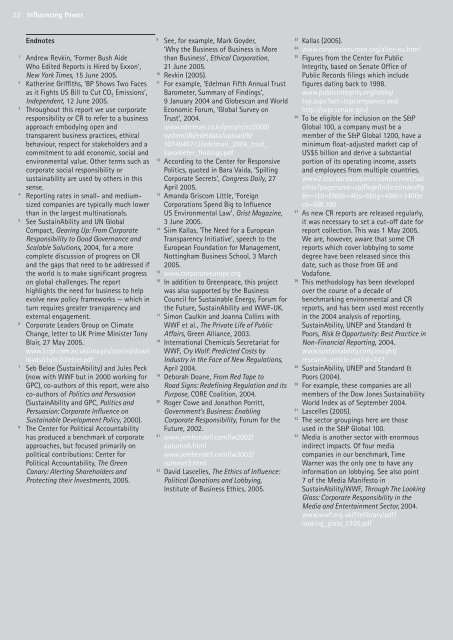
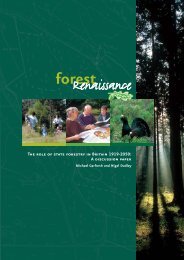
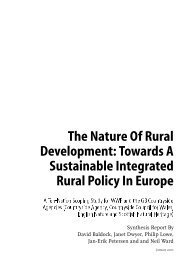
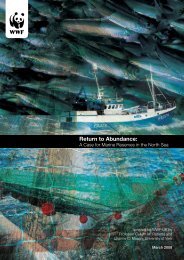

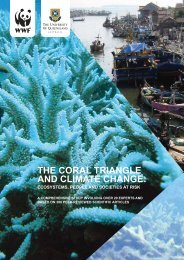

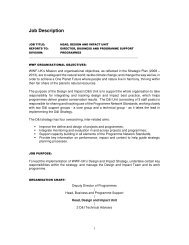

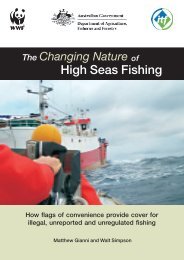
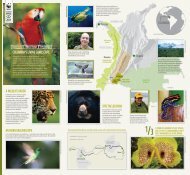
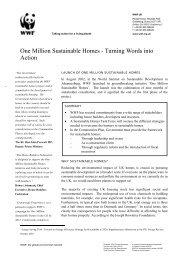
![[PDF] Causes for concern: chemicals and wildlife - WWF UK](https://img.yumpu.com/31929970/1/184x260/pdf-causes-for-concern-chemicals-and-wildlife-wwf-uk.jpg?quality=85)
